#but i'll take it anyways because i need a way to reclaim some power in the fucked up mess that is
Text
I continue to be in awe by the power granted to me by having learned to read scientific papers.
#it took fucking FOREVER and sucked so bad for like the first year but wow i can learn so much stuff now!#i still can't understand all of them because i am an ecologist and don't have the background for other fields but usually#i can at least get the gist and a few important details out of all but the most dense ones#anyways i find it reassuring that i can read medical papers about things that are relevant to me and see what the experts are#saying about it when they think no one outside their field is watching#sometimes the data matters more than whatever they say in the 'translated for public knowledge' version or even contradicts it#would doctors be pissed to know i can do this? probably!#yes i am aware of the risks of taking information out of context that i lack the background to understand#but i'll take it anyways because i need a way to reclaim some power in the fucked up mess that is#the imbalance of power between medical professionals and their patients#hylian rambles
6 notes
·
View notes
Note
The ending of Saeran'AE would have been better if Saeyoung had beaten the PM to death with MC cheering him on in the corner (With detailed CG included and Saejoong screaming).
...Nah, let them join in too, Go for it! 👊🏻 hahaha.
Oh, that's absolutely what happened in the hospital and I think the only reason Vanderwood was with Saeyoung was to make sure that he didn't bludgeon Saejoong Choi to death. I'm certain many folks in that hospital turned a blind eye for sixty seconds.
I do not doubt what happened that day as soon as the Prime Minister left the room with Saeran and MC. I do not doubt how fast he was hit and taken down. Those facts are clear-cut in my mind. I... will say one thing, though, he willingly walked into the hospital hallway knowing that his son was going to beat the ever-loving fuck out of him.
Don't get me wrong, Saejoong Choi is a piece of shit and deserves no praise for the bare minimum he owes his sons. But, he spent hours in Saeran's hospital room and we don't know what they talked about. I'll place a bet on Saeran scolding his father and telling him that if there is any remorse in his heart whatsoever, then he needs to do the right thing for Saeyoung and let Saeyoung be the one to not only take him down, but accept whatever punishment Saeyoung wants to dish out before that happens.
Saeran knows Saeyoung has a different view in life. His brother does not need to forgive their father, that's not what he needs to find any peace in his heart. Saeran forgave his father to learn how to forgive himself for what happened in Mint Eye... and Saeyoung deserves to hold onto his hate because it's not hurting him or anyone else (who doesn't deserve it, anyway).
He might not have had the opportunity to be with his brother since they were little kids, but if he knows anything about his brother? It’s that Saeyoung has always been just as afraid as he was. Saeyoung spent years… trying to be brave… trying to be strong… trying to be the adult he and Saeran needed because their parents were never going to do that for them.
Saeyoung has felt powerless his entire life, and Saeran knows his brother would never admit it.
I feel like that's why he pretended to be asleep for as long as he did in his hospital room. It wasn't about feeling strange around his brother after being separated for so long, nor was it just about the fact that they had different perspectives on life.
On that day, his procrastination to speak with his brother face to face wasn't about himself. It was about making sure his brother had the opportunity to reclaim his power.
No longer will Saeyoung choke on fear, that’s what Saeran thinks. My brother won't have to be afraid anymore. My brother won't have to go out of his way to do everything he can to make sure we stay alive. My brother can take down the monster who has terrified us since we were kids, and in this way, he can finally have the life he deserves. My brother might want me to live a life where I have everything I could ever dream of, but I want him to have the same thing, and for him to have that, he needs to be the one to take down our dad.
He knew what his brother needed more than anything. Saeyoung needed to put away their father with his own hands. He needed the chance to make sure that monster would never come after him or his father ever again. He needed to know that he would never have to be afraid ever again. There is no way for him to feel that way unless he is the one who personally makes sure his father can never see the light of day again.
Saeran fought to give Saeyoung what he needed by standing up to their father who came crawling back in the hospital to talk to Saeran after the day on the lake. I will never ever imagine that very scene any other way.
Saejoong didn't turn over a new leaf because Saeran gave him some understanding instead of hatred, and he says that himself. That man knew he would go to prison forever, but decided to face his sons one final time... for reasons we'll never know. I think he knew he was in a corner and it was only a matter of time until people took him in and he rotted away forever. But, we'll never know why he choose to face his illegitimate sons.
We will never know what was going on in that man's head. But, at least the very last thing he did for his sons was stand there and take everything they had to give. That is the least he could give them and God knows they deserve more... they deserve so much better than... than that man. But, hey, he laid there and let Saeyoung beat the shit out of him until he was bloody and bruised.
Saeran is the one who told his father to do it.
And, for whatever reason, Saejoong Choi let Saeyoung absolutely beat the shit out of him.
#mod kait#ask#mystic messenger#anon#mysme#saeran choi#mysticmessenger#mm#choi saeran#saeyoung choi#choi saeyoung#luciel choi#choi luciel#seven#707#ge saeran#saeran#saeray#character analysis
22 notes
·
View notes
Text
On it/its Pronouns, Gender, and Becoming
This is mostly for the cishets, but it may be helpful to someone out there, so I’m sharing it anyway.
I've been getting some questions about my pronouns, so I thought I'd give a small explainer for MY reasons for using the pronouns "it/its". To clarify: these are MY reasons for using those pronouns. Trans people have a variety of reasons for choosing the pronouns they choose and can, and often do, shift, add, or discontinue the use of certain pronouns along the course of their lives as their understanding of their own genders changes.
Here's the shortest, most key point of the explanation. I use "it/its" because it gives me gender euphoria. It *feels* right when people use them to refer to me. That's completely subjective and that's fine, gender and pronouns don't have to have any deeper reasoning behind them besides making you feel seen and affirming your self-perception.
Now, being who I am, I've put a lot more thought into this. You don't have to follow any of the other arguments here, they're pretty specialized concepts that have been the source of debate and discussion in the trans community. Trans people in general think much more deeply about gender as a concept, their gender, gendered language, and what is signified by gender than cis people. That is only natural given the amount of thought that has to go in to deciding to defy the normative system of gender assignment.
So to repeat, if this sounds overly academic, arcane, or like hair-splitting to you, that's expected and normal. All you need to know is that using a given set of pronouns is what someone likes, and then you use those pronouns. It can be that simple. If you'd like to know more, read on, and I'll try to keep this coherent.
First layer: Slur reclamation
For a trans person to adopt "it/its" pronouns is to reclaim a subtle slur that has been levied at trans people for a good while. By choosing that, one takes away the power of the bigot in a small way. Not every trans person agrees about this, so it's one of the bigger stumbling blocks for allies. Don't use it/its unless someone asks, but if they do, this is often part of it. It is for me.
Second layer: Neopronouns
"It/its" are considered to be part of what are known as "neopronouns", newer pronouns being used to represent a variety of experiences with gender, including gender non-conformity. Singular "they/them" is NOT a neopronoun, having been in use for centuries, including in Shakespeare. Examples of neopronouns include: xe/xem/xer, ze/zer/zem, fae/faer, and ey,em. No one knows if any of these will gain widespread traction, come to represent gender archetypes that are distinct third or more genders, or what. It's still very new, and forecasting things like that is impossible. Again, as in all things pronouns, if someone asks, respect that.
Third Layer: Xenogenders
Ok, so this is where things start getting more philosophical and theoretical. Beyond slur reclamation, and beyond trying out neopronouns as a way to denote a non-binary gender in general, there's xenogenders.
This one is really not on mainstream radar at all basically, and in trans community it's controversial. The basic idea is that a xenogender person identifies with something *other* than human as a gender. It's a really broad umbrella. Now, this is where a lot of people get lost because they're familiar with a certain set of societally accepted genders (yes, non-binary has varying levels of acceptance, but it's in the general social schema now).
Here's the thing, people have been arguing about *what* gender *is* for literal millennia. The ancient Greeks argued about it, Ancient Egyptians have Hatshepsut, the Sumerians had a trans priestesshood of Inanna, Scythians had early HRT and transition. There's a lot of ideas and nuance and discussion across philosophy (trying to come up with a coherent, universally applicable approach and definition) and anthropology (how have humans experienced gender and lived it through time?), but NOT medicine. Medicine and science are not able to discuss gender because first, they're dealing with questions of observable biological phenomena and gender is on the level of an abstract concept. Sex is biology, gender is society. Second, biologically observing sex is vastly complicated on its own.
Anyway, there's a few major theories of gender that I have a basic knowledge of:
The Gonadal Model: this is what people who say that gender is "what you have in your pants" follow. It's a pretty bad model. First, unless you're extremely close with someone, you have no idea what's in their pants. You generally assume that based on other characteristics about their appearance and behavior. Second, gonadal expression is unreliable, even if you attempt to verify it. Intersex people exist, in greater quantities than redheads. Some have genitalia that does not fit into a "standard" model. Some do, but don't have those secondary, outwardly visible characteristics that one would "expect". And some appear to fit into a "standard" category while having invisible chromosomal abnormalities that they, their doctors, and other people might never know about. Seriously. A person can have XY chromosomes and develop a female biological expression and never realize that their chromosomes are otherwise. Almost no one ever actually tests their chromosomes.
Performativity Theory: this is the idea that gender is the mix between what one person "performs" as their gender and what others around them categorize them as. Which gendered signals does a person send? Do they have long hair, makeup, are shorter, and have a specific vocal pitch? That is read as woman. Tall, hairy, deeper vocal pitch, and aggressive? That gets read as a man. Passing trans women would then *be* women. Butch women might be read as masculine to the point of being called men in some situations. Feminine gay men might read as more feminine than masculine, or be accepted as "one of the girls". The idea here being that society should be more open to accepting trans people as the gender they claim because there's an attempt to fit into those roles and signals. Basically "You are what you signal, regardless of the skill at signaling." It's more expansive, but has limits.
Self ID Model: a person is what they say they are. This is the only model that includes all cis people in the gender they claim, and does not exclude any cis people. Conveniently, it also includes all trans people. Now, this opens up to the classic "slippery slope" of trans identity: "If people are what they say they are, what if someone says that they're an animal/alien/attack helicopter? This says they are, when they clearly aren't!" Yes. Yes it does. Unsubscribe to the idea of gender as an emergent self-schema, and gender as play. Gender is what a person understands themselves to be, and that emerges over the course of their life as they experience, learn, and experiment. It's the best way I have found to talk about how I, and others describe experiencing things.
I grew up without knowledge of trans-ness, and therefore couldn't understand myself as trans. I always felt uncomfortable, or inadequate in fitting into masculinity. Once I understood more, I put names to feelings, and developed the conceptual vocabulary to understand myself. My gender emerged. It continues to emerge. Even cis people change their relationship with the social standards of their gender and what it means to them over their lives. It might not end up as far from start as trans journeys is all.
So, finally getting down to trying to put my gender into words. I do not identify as fully *human*. I've experienced an alienation from society and humanity as whole for most of my life. I want to be seen as *femme*, or having feminine traits and presentation. To be "female shaped". I also want to transgress expectations, being bald and not wearing a wig is one aspect of this. I see myself as succubian, a gender identity describing wanting to embody feminine seductiveness and sexuality, to the point of hyperromanticism or hypersexuality. Many succubians come to this as a result of sexual trauma, but it's not required. I also want to be see as a witch. In the old, scary, but also capable and caring for those considered part of the community. It's not easy to explain fully, it's easier to express in fiction and metaphor. This is my attempt to get there with the *shortest* amount of explanation and theory lol. I think it is a grounded perspective, based in gender theory, logic, and lived experience. People can disagree, just be polite about it.
Fourth Layer: Not A Person
Not A Person is a term in use among some of the trans community, it is VERY niche within a niche. Again, this means different things depending on who is saying it, and _when_ they say it. What I mean is very much informed by this essay: https://voidgoddess.org/emptyspaces/notaperson/
The basic idea is that as a society, we do not think of ourselves as hurting people. We care about people. We're dealing with problems, like immigration, houselessness, mental health, and "LGBT Grooming". This lets us abstract away the harm to people by removing their status as a Person. So fuck it, I'm not going to try to gain the conditional respect that is clearly inconsistent and used to split society into People, and Unpeople. I'll take that Unpeople label and wear it with pride, expressing solidarity with all the other wretched and oppressed. I never liked society's constraints anyway.
It's a conscious rejection of social approval in favor of radical empathy and individual expression. I'm Not a Person, I'm so much more.
Obviously this is controversial, and not any kind of prescriptive rule for living, but it's a reminder of where I stand, and with who. Right now, I could put my old clothes on, and aside from already having made changes to my ID, pass as a white cishet man. I could easily boymode and use that perception to access social privilege. Every day, I wake up, and choose to express who I am, even if it makes the world a much more dangerous place. I accept that danger, and my otherness, and wear it as armor. I use it/its pronouns as part of that, and as a way to make people uncomfortable in order to give them cause to examine that discomfort and do a little bit more thinking than they otherwise planned on that day. Hopefully it helps them grow.
50 notes
·
View notes
Text
Euden and Power - An Analysis
One thing that was rather interesting to me when I first realized it is Euden's interesting...relationship? with the concept of power. I'm probably yelling to the wind with this but I personally try keep these things in mind when writing him and maybe it might be interesting to someone else. Warning: very long post ahead!
So Euden, from the very start, is not exactly power-hungry. In fact, he's perfectly content staying in the capital, not forming a pact to avoid potentially causing discord in his family if they now view him as a threat. He dearly doesn't want to be a threat. He just wants to be with his family, and serve/protect his country/family in his own way, without needing much power beyond what he has as a prince.
Here's one of the relationship charts they made for advertising at the beginning of the game:
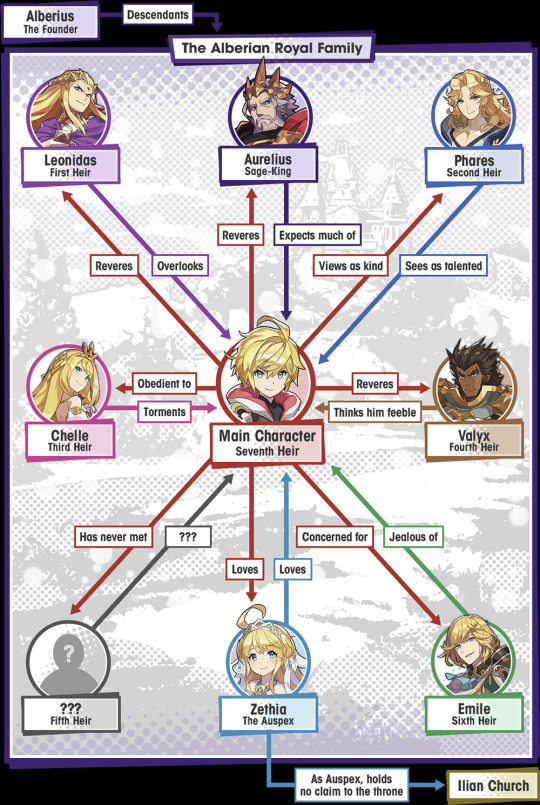
I think it's also notable that he was able to perfectly pull this goal off in the beginning. Leonidas has given up on all siblings of his after Valyx, viewing them weak and unworthy of his attention. Phares thinks him talented, which while Phares never clarifies exactly what aspect he thinks Euden talented in, isn't exactly something like 'views as a threat'. (But I will give credit to Phares, in all of his touted wisdom and insight, still is able to identify his youngest brother as having talent in anything, given some of the others). Chelle certainly seems to love to tease him, and certainly isn't very feeling threatened since she plays him (+everone) like a fiddle. Valyx 'thinks him feeble', obviously not scared, more likely viewing him at best in the 'weak sibling that needs protection from his stronger siblings' category.
Jumping to Emile, who views Euden as lesser in every way, and is growing angrier that Euden is 'taking beyond his station' by being loved in any capacity or trusted with important things. His anger is borne out of strong feelings of Euden's inferiority, because that is how Euden has set himself up in his family and 'confirmed' it to Emile: that the others are better, wiser, stronger, and he's not going to challenge that and risk their ire. So when he does move out of that comfort zone when Aurelius tells him to reclaim the shard and form a pact, everything is shaken up.
Euden's suddenly been thrust into needing to seek power to accomplish what he wants- one dragon, two, - five Greatwyrms, who knows how many other dragons and drakes, then he's setting up his own kingdom. Not for himself, but for others: for his citizens who are suffering under the reborn Empire's rule, and for his Father and later Zethia (since Euden seems to be of the opinion that Morsayati!Aurelius isn't his father's body or soul at all, likely indicating some thought of 'somebody's captured and impersonating Father, I'll need to rescue him'). He wants power now, but not for itself or himself, only for others. It's a means to an end.
We also see this in the lackadaisical way he runs his castle. We all joke about the daily chaos at the Halidom, but it's also a reflection on Euden's stewardship as lord. He really doesn't like being in positions of authority when possible, and so generally chooses to express the least amount of power he can to not be or come across as someone better or more important. He only acts as lord when needed to protect his country, friends, or other important things, largely trusting in his friends to govern and guide themselves without a strict rule.
But anyways. Back to canon. Well, and events. And oh boy, 1st anniversary brought a lot of material for me to talk about here. First, of course, there's Gala Euden, whose entire adventurer story shtick is him struggling with the problems excessive power brings because it causes others to fear him and grow apart from him. That is a very important concept regarding Euden in another way (his hyperfocus on other people instead of himself) but I digress. That's a rant for another day.

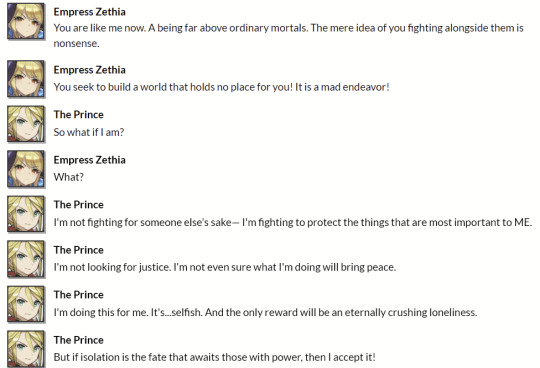
In the end, Euden resolves himself to continue to gain power, even in the face of 'eternally crushing loneliness' this power will bring, much the same as Alberius before him. His friends rescue him and try to remind him that they'll be there with him, sure, but his actual resolve on this notion...doesn't actually change much. If it is needed, he'll do it, even if he strongly prefers and needs his friends with him.
Then came Fractured Futures, an event that starts from Chronos preying on the fact that Euden just woke up from yet another nightmare and lamenting his lack of power back then to manipulate him into time traveling for his secret true liege. As such, Euden is largely alone with Chronos for this event, save for Audric. And right as Chronos reveals his true colors and is in the process of killing a Zethia, he curses at himself in a much stronger critique than he'd ever likely throw at anyone else. I quote: "Dammit, you stupid body! Move! MOVE!"
...His powerlessness has struck again, causing a Zethia to die before his eyes. And in his mind, he's no one to blame but himself and his own weakness. And so, he resolves to get stronger. Not because he wants it, or for personal gain and satisfaction, but for others.
He loathes it. Or rather, the need of it for his desires. From it, he's antagonized most his siblings now turning on him as a threat in war or a threat to their own self-perception in Emile's case. But still, he proceeds.
Thus forms the twisted relationship he has with it: he needs it, seeks it out, but dislikes some of what it has brought to him. But he's going to do his best not to let anyone know about these struggles, because Euden is Euden and Euden is hard set on not burdening anyone with his 'weakness'. It's noted several times how he's always trying to do too much on his own, and shown in others, like Gala Sarisse's story where he outright collapses from overwork.
He's trying to do everything on his own power, and will struggle by himself until he burns out and can physically do no more. Things change, though, when Bondforged Euden arrived.
By now, Euden has been forced to accept that he is not Atlas (the mythological one, not the -metheus' brother!) and does, in fact, need his friends. Chapter 23 alone further stresses this when he again tries to take on too much too soon and needs put in place by his siblings. And then the world can 'reward' that acknowledgement in the form of more power.
It's kinda an interesting give and take in the larger narrative. Euden trying to do things on his own are generally discouraged/'punished', and relying on his friends or trusting in them is rewarded. Even the very beginning, he tried to set out alone without Zethia or Notte as not to endanger them, but quickly finds himself in need. Zethia rescues him, he acknowledges that he was a bit overconfident, and then things start going smoother.
All in all, I know this is probably getting way too rambling, but at its core, Dragalia has yet another message aside from family and loving yourself and all the other overarching themes of destiny, etc: "You shouldn't try to do everything yourself. Working together with others makes you more powerful, not weak. Needing others' support isn't weakness."
There's a lot more I could say and add about it, but I think it's one of the cooler subtler threads to Euden that easily can go overlooked in the larger identity crisis and all that. So yeah, I think Euden struggles a lot with the need of power he has/the results thereof, and when he finally accepts that he will never be able to 'hold up the entire world without burdening anyone else', that's when he's strongest.
Hope you enjoyed this sprawling mass of text, and hopefully all the images and stuff are clear!
30 notes
·
View notes
Text

funny weird fursona from ages past hours
while i wanna take this opportunity to share my art, i kinda also wanna reach out to everybody who had cringy neon old fursonas and oc's that they're embarrassed of or feel like they need to shittalk every time they mention them bc "theyre totally better at making characters now i swear!"
this is my fursona splash. i've changed sonas a few times, but none of them will be as important to me as her. she's not there yet, but next year in february, on my birthday, she will be 9 years old. i made her feb 22nd of 2015, my 9th birthday.
i stopped using her eventually, because i thought i'd grown out of her.
i used to show her to people and laugh about how stereotypical of a mary sue she was, how she had a demon AND angel form, how i'd ship her with characters from whatever media i was interested in at the time, how she had super secret sparkle powers that could do anything and how she's "not me anymore"
then i remembered how crushed i felt when my friends at the time first started calling her one. i was knee deep at that point in thinking mary sues were dumb, and felt really bad about it when a friend said she was a huge mary sue and how i should probably change her. they even got mad when i said i didnt want to and told me i "couldn't take criticism".
ive tried so hard over the years to distance myself from her while trying not to be too hard on her, to enjoy her in an "ironic, more experienced way" and regard her as what NOT to do.
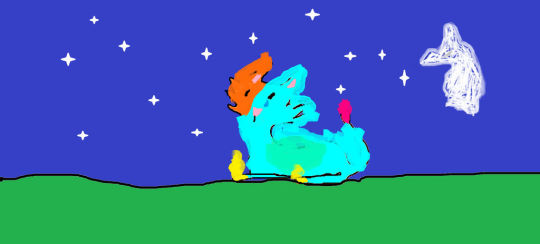
this is the first ever drawing i did of her. another oc of mine turns 9 on my bday, and ill do art of her too, but this is where i made her.
she was a drawing of firestar that i got bored drawing and decided to slap some neons on from the ms paint advanced preset colors. as you can see, she hasn't really changed much. her name used to be colordrop, because i had a stuffed bunny around that time with the same name. i think i renamed her to splash because i liked splashkittyartist.
is the art good? no. did i really care? not really! i didnt even know it was bad at the time, because it honestly wasn't. i just wasn't as far in my art journey as i am now.
im glad i never deleted my deviantart account, and i plan at some point to go through and save the images that are important to me on a google drive of some kind. aslong as im able to remember and keep her, she's an important part of myself.
she's still me, just from a different time, and also so much more than that. im not sad about her, not in a nostalgic "i wish i could go back way". im happy, if anything, because i only recently realized we shared a birthday. isn't that cool? to not only have an oc that was made on your birthday, but reaches milestones with you? when she turns 18, i'll be 27. when she's 27, i'll be 36. i think that's pretty neat.
i think it's important for every artist, if they struggle with this, to look for their old oc's and fursonas and whatnot from when they were kids and instead of looking at them through a lens of "im better now, do you see how bad i used to be at this whole character making thing though? its funny.", instead be kind to your old creations and go "wow, i had alot of fun with you. i wonder if i can have even more."
if you're able to, start using them again. write with them again, even if its small and silly and more out of whimsy and joy than actual plot development. i implore you to be kinder to kid you. even if kid you wasn't very kind themselves. if you would look at another kids drawing and oc and go "wow thats amazing! you're so creative!", then you should regard what you made then with the same enthusiasm. put your own work on the fridge if nobody else did.
anyways, ramble over. i'm very passionate about this subject because i lived it, and i deeply enjoy reclaiming what i was made to feel embarrassed of.
so moon darkraven, demon wolf with an anime scythe and scene bangs and red eyes and neon colors that don't mix, i think you're doing great. i hope you're doing well, wherever you are now, and that so is the person who made you.
happy early birthday to me and my special little gal
9 notes
·
View notes
Text
Someday... perhaps I will Learn

I always have this idea that one day... maybe... just maybe... I will learn to do things differently. And yet... here we are spilling a paint pot yet again because I did nothing. I had these thoughts "It''ll only take a second..." and "I only have one thing to do..." so... I do this. Purely an accident but at least this time it didn't happen on a paper towel and instead happened on a surface I could at least reclaim a small portion of what I spilled.
Incidentally, I have discovered soju. It is lovely. Nothing to do with this incident but is influencing this writing. I believe in honesty and integrity. Thought I should mention it in case something REALLY weird shows up in this post... or the next... BE AWARE. I watch a lot of Asian television and went to an Asian festival over Memorial Day weekend in Columbus Ohio. Four more Sundays and I am no longer an officially appointed pastor. My status will be reduced or changed might be a more appropriate word to licensed but not appointed. Shhhh.... they don't know about this blog...
Life happens. Try to be careful. There are so many things you can do prevent spills from pots and I am sure that many will commentate without reading because well... they need help. It is human intuition t try to fix that which is wrong. I could list a dozen different way I could fix the problem, I don't need your advise. That's not why I am writing this. I am writing this because I am human. I screw up despite knowing better.
I could use the museum wax I have readily available to me. I could be more careful. I could use one of a hundred things available to me to buy to make my life easier that I just don't buy. I could put the shades and contrasts I use in dropper bottles (I have a whole jar of empty ones). I could do lots of things... but I didn't. Because I am a person. I screw up. I admit to it. It was dumb and yet I did it anyway thinking to myself "this time will be different." I preach on this ALL the time. Thinking I'll be better than I am.
I am showing you my mistake not for pity but to show that I am human because I am under the influence of a bottles of soju and some Truly Vodka, which is inhibiting my prefrontal cortex, and allowing me to tell you humans do stupid sh*t. We f*ck up. But there is a power in this universe beyond us. I feel it. I hear it. I will tell you what it tells me.
You can read my posts or not. I don't care. It does.
The alcohol on occasion, but not always, helps me to stop thinking as me, talking as me, and allows that voice to speak the warnings it keeps telling me and has told every prophet before me: It's not too late.
#miniature painting#how not to paint miniatures#painting miniatures#dungeons and dragons#d&d#vallejo#citadelcolour#citadel shade#prophecy#theology#truth
3 notes
·
View notes
Text
my 6B prediction is that madney will ultimately decide together that while traditional marriage maybe isn't the path that feels most right/comfortable/organic for them (due to the Doug of it all), they do still want to cement their relationship, their family unit, their rights to visit each other in the hospital in case of emergency, their housing and benefits and financials, etc etc on paper in some form, and they do genuinely want to have some form of small ceremony celebrating their love in front of their friends and family.
madney has such a strong history on this show of chimney offering maddie the world on a silver platter and being genuinely, over the moon happy to be the guy who gives her the space and the freedom to pick and choose what she wants, what she's ready for, what works for them both, societal norms be damned. they do things on their own terms! their i-love-yous, moving in together, having kids, taking time apart when they need to, co-parenting, even the way that they found their house. and that organic, choose-your-own-adventure aspect of their relationship is one of my favorite things about them.
soooo, like- madney commitment ceremony. madney civil union. madney registered domestic partnership. or something along those lines: maddie, getting to stand in front of her loved ones and make a commitment to chimney, that she's done running, that she's happy to put down roots with him in their new house with their little family, but in a fresh new way that's unique to them, and wholly on her own terms, and without any of the baggage and trauma she has surrounding marriage. maddie getting to pick and choose and have that freedom of choice, embracing the aspects of traditional marriage that she does want, without having to compromise with all the drawbacks. maddie, the girl who always has to run for her life, choosing to stay.
and chimney!!! the guy who proposed to tatiana way too early in a very traditional way, even though they barely knew each other- because it's what he thought he wanted, because he liked her so much, because he wanted to feel wanted- only to get rejected. how powerful and healing it would be for him to know that maddie, the love of his life, a woman with so much trauma surrounding the idea of marriage, loves him so much that she wants to find a way to honor and commit to and celebrate that love, even if that way winds up being a little quirky, a little offbeat, a little unexpected.
there's definitely something to be said about the idea of maddie 'reclaiming' marriage, but i just can't stop smiling at the thought of her playing by her own rules instead and opting for something a little less traditional. and on a show that loves to highlight all the different kinds of commitments that partners can make to each other, all the many ways that human beings have invented to say i love you, and i want to be with you forever, and i want everyone to know, and with episode titles like 'death and taxes' 'lost and found' and 'love is in the air' coming down the pipeline- i think it's time for civil unions/domestic partnerships/commitment ceremonies to shine.
chimney, offering marriage.
maddie, knowing she has full license and freedom and agency to say 'mm, not feeling the marriage license part, but i'll do you one better: i want a ring, and a hyphen in my last name, and a beautiful ceremony in our new backyard, and a pretty dress, and a different piece of paper that still says i'm here to stay.'
chimney, delighted and ecstatic and just beside himself with happiness, because like- in its own way, that's almost better, really? because there's nothing he loves more than getting the chance to love maddie on her own terms.
anyway. madney civil union/domestic partnership & commitment ceremony. that's it that's the post.
#911#madney#maddie buckley#chimney han#maddie buckley-han#chimney buckley-han#jee-yun buckley-han#911 spec#911 meta
14 notes
·
View notes
Text
The Guardiana Magic School Run - Part 8
Well, last time was tough, but at least now we get to chill on a little sea voyage.

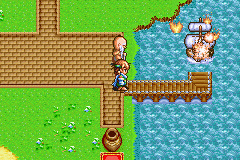
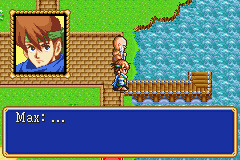
Except of course we don't. Let's go beat up some zombies instead I guess.
Sadly, the chapter ends as soon as we finish Shade Abbey, so this is our last chance to buy stuff. I still don't have enough money for the Zombie Charmer nor got to win it in yesterday's disaster bonus, but I don't care much. Everyone is hitting hard enough in this team by now, my worries for the next battle are all defense-wise. The Charm Ring will not help because none of the enemies use magic, but it's our last chance to buy them so I'll get a last one anyway. It goes to Gong because I'm still mad. I did check the deals section beforehand, there's nothing new.
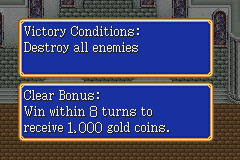
The bonus is just money so it's not that pressing, but (hubris incoming) eight turns does not sound like much in a tiny battlefield like this.
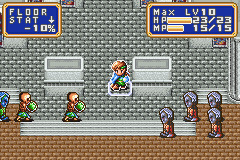
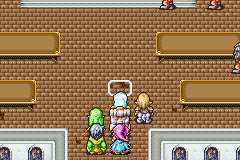
Max being alone there worries me little because he's overpowered. Anri and Arthur starting in the front though is a horrifying sight. Thankfully we're all faster than the enemies.
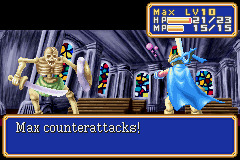
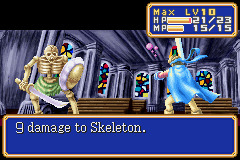
See, there's no need to worry.
Also I just remembered Max is already up for promotion, I honestly have no clue if it's better or not to delay his promotion or whatever, I tend to just promote people whenever they start finding weapons that require promotion. Spellcasters however have a problem in this version that I'll explain later when we aren't, you know, in the middle of battle.

"Yes, we can always make time for a lesson."
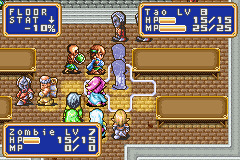

"But let's clean up the classroom first."
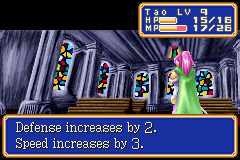
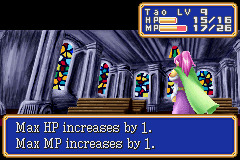
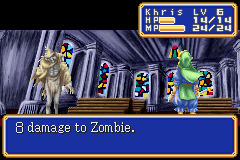
I'm curious as to how much the Zombie Charmer would be doing, but as you can see the Power Staff is doing just fine.
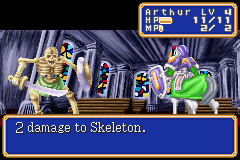
This guy however is hopeless. Jk, the skeletons do have greater defense. And he's only 3 exp away from his first level up, so any scratch counts. And he indeed gets it next turn, honestly there's not much else to talk about, this battle is super easy compared to the last one, Max isn't talking much damage even when poisoned, and the enemies are downright turning to avoid other characters sometimes, it's ridiculous.
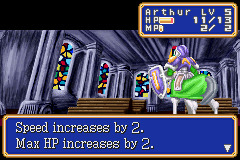
Arthur's level up gives him +0 attack and +0 defense.
sigh. we have a long way to go with this guy.
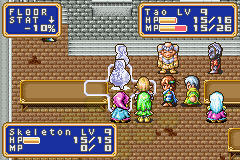
In the meanwhile Tao continues to have so much fun. The skeletons only take 6 damage though, so there's definitely some resistance afoot despite the game not showing it. Usually that's the case for elemental resistances, but that's weird since fire is often advertised as the element good against undead.
We're at turn 5 and only the Ghoul is left.
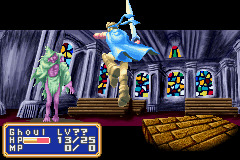
Max clearly won't have any trouble unless this thing has absurd attack or something. He also levels up, but gets very little stat increase. I feel Max should be promoted early because his epic level ups have chilled by now.
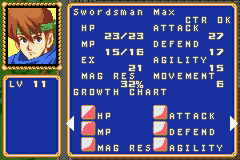
Which feels weird, because you can see growth rates in this version and, aren't the attack/defense/speed ones implying they grow better at late levels? That's kinda the opposite of what's happening.
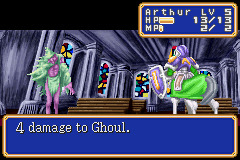
Hey, that's more than I expected! Despite being the boss, the Ghoul still has less defense than Skeletons. Arthur gets another level up for his efforts, gaining +1 defense.
Like, just that. 1 stat point. Oh Arthur.
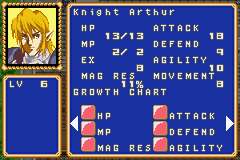
Again his curves imply the opposite of a late bloomer to me, either I'm messing up badly at reading these or there's something wack here.
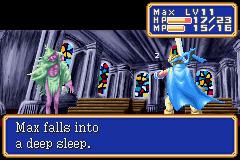
Also I forgot the Ghoul could do this. This man can't catch a break, but I was actually gonna let others get the exp anyway. Sleep man. Dream of better boats.
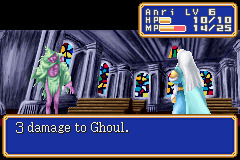
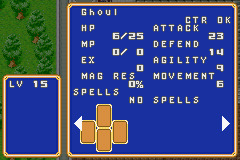
Hey, again with this! Stop lying to me about resistances! (Anri used Blaze 1 here).
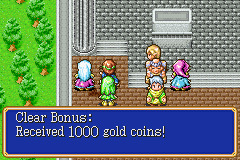
Because of this nonsense, it takes an extra turn for Anri and Arthur to finish off this guy, but we still get the clear bonus with a turn to spare, because we're that awesome.
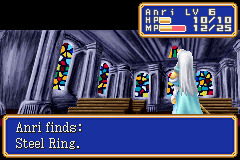
Anri also reclaims a relic of Guardiana from the undead forces. I'm legit wondering if he's the only one to drop this, in which case it's very interesting, is this guy supposed to be the real priest? I'd expect zombies to be made from older corpses. Though there was a whole line of Anri relatives buried here anyway. Why am I discussing lore in the middle of a challenge run, see this is what happens when the battle is too easy.
Let's move on, not that there's much else here, we say hi to Amon and Balbaroy and head to Bustoke, ending the chapter. I find it kinda weird that Balbaroy says "let us know when you're ready" but you're not given a chance to get back to town. Feels bad.
But in the end it's good that the post is short so far. We have business elsewhere after all.
And that business deserve it's own post actually. See you soon :)
Losses: 0
Deaths: 2
The expected deaths on Narsha interludes: 0/3
#shining force#shining series#guardiana magic school run#sf tao#i've actually been sitting on this and the next one for more than a week because i wanted to give full attention to narsha's#and this month's been bbbbbusy
2 notes
·
View notes
Text
Reviewing Star Trek TNG - S3E17 "Sins of the Father"
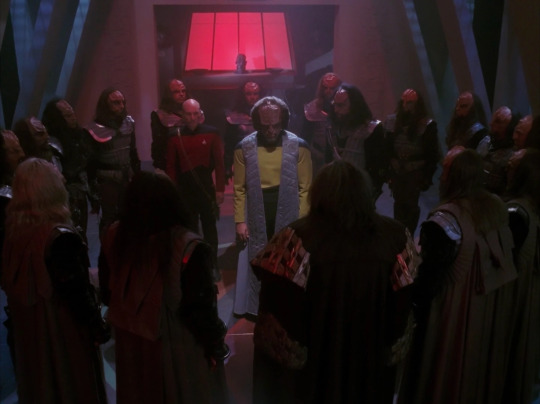
THE PREMISE
As part of the Federation-Klingon officer exchange program, Klingon Commander Kurn (Tony Todd) has requested to be transferred to the Enterprise as its first officer. His more aggressive Klingon command style aggravates the crew, particularly Lieutenant Worf, who finds him patronising. Worf confronts Kurn alone, and the latter reveals that he's actually Worf's younger brother.
MY REVIEW
Why exactly Kurn feels the need to hide his identity from the Enterprise crew is… unclear. It feels like someone realised partway into the writing process that they needed to make the plot more interesting, so they threw in a familial connection to spice things up.
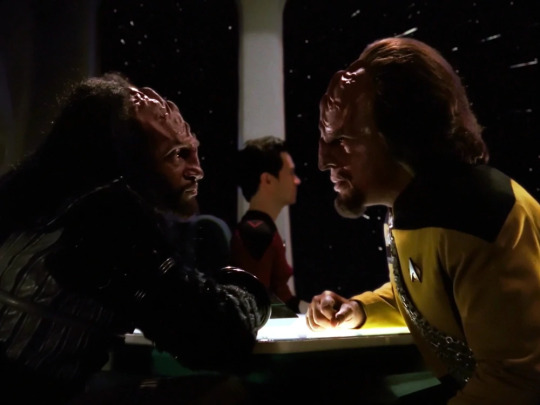
Kurn explained that as a baby he had been left with a family friend when their family went to Khitomer, so he avoided the massacre that wiped out the rest of their family. Kurn was adopted by the family friend, who told him the truth when Kurn reached the Age of Ascension. Worf was sent to live with foster parents because Starfleet (and the writers) had no idea Kurn was alive. He's only just now meeting with Worf because their late father, Mogh (pronounced "mogue"), has been accused of treason by supposedly helping the Romulans with their attack.
Suddenly the plot takes a hard left turn into Worf trying to clear his father’s name and reclaim his precious honour. It wasn't surprising to learn that Worf's brother coming aboard the Enterprise and his father being accused of treason were two separate ideas combined into one script. It’s… fine. Klingon storylines often feel kind of one-note anyway, so it’s nice to have some variety.
Picard agrees to back Worf up as he makes the challenge, and he orders the Enterprise to set course for the excellently designed Klingon homeworld Qo'noS (pronounced "koh-nos").
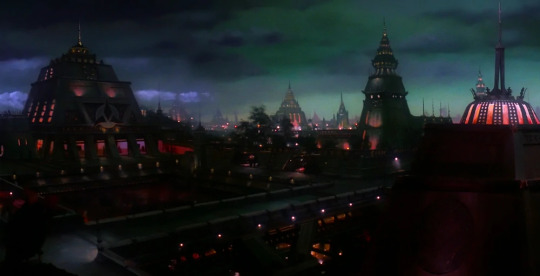
On the way there, Worf agrees to let Kurn be his Cha'Dlch, or ritual second, or lieutenant when there's reckoning to be reckoned. However, Worf reminds him that he can't reveal his true bloodline.
They arrive at Qo'noS, Worf beams down with Kurn, Picard and Riker in tow, and challenges the accusations made by Duras, the son of Mogh's greatest rival.
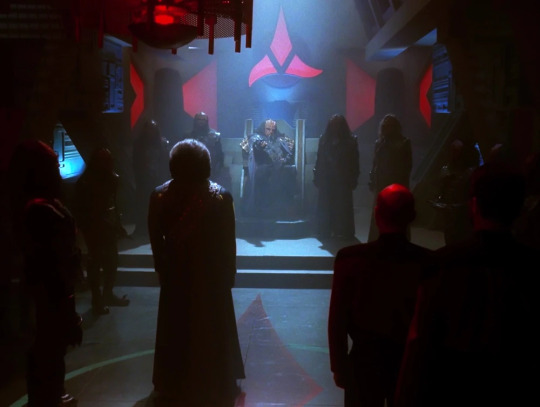
There's a lot of the usual Klingon guff around honour and such like, but the crux of the matter is that Worf is branded a traitor for bringing the challenge against Duras. After the council calls a recess, Duras tries to blackmail Kurn into betraying Worf to avoid his true bloodline being revealed, but Kurn refuses and gets stabbed.
Dr Crusher assures him that the injuries aren't fatal, and Picard takes Kurn's place as Worf's second.
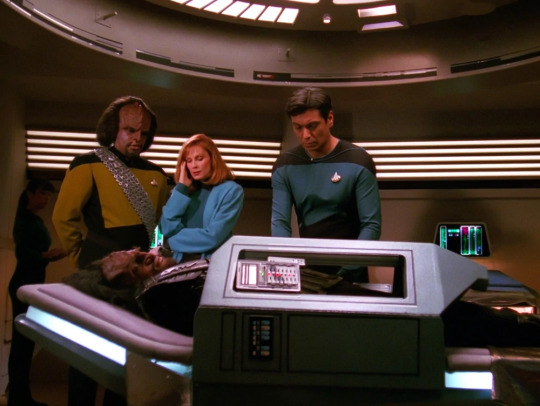
Look, the plot gets kind of long-winded and isn't terribly interesting, so I'll give you the gist.
They compare evidence from two ships - the USS Intrepid, which was the first responder to the massacre, and the Romulan ship through which the Klingons found out about Mogh's supposed treachery - and realise that Duras' evidence was faked.
They track down a survivor of the massacre, she agrees to go with him, it turns out the whole thing is a cover-up to save Duras from disgrace, since it was his father who helped the Romulans attack Khitomer. Only problem is that Duras' family is too powerful to accuse without causing a civil war, so they used Mogh as a scapegoat because they didn't think Worf would challenge it. But now things have escalated, and both sons of Mogh must die.
Can you tell I'm getting bored yet?
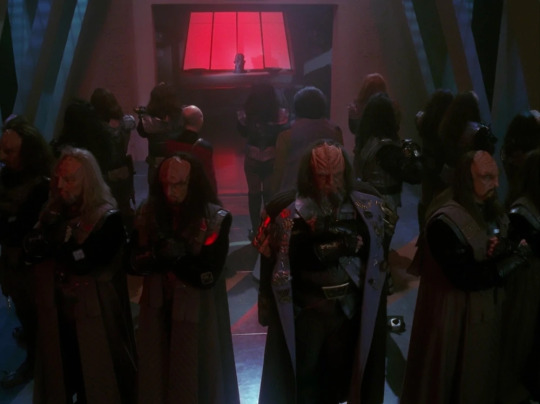
Long story short, Worf volunteers to die to save his family's honour, Duras says no (cuz honour would dictate that Kurn get revenge to compensate) so he settles for a discommendation and a loss of honour to let Kurn live. They go through with the ritual and they go back to the Enterprise. Yay.
My research (by which I mean checking this episode's Wikipedia and Memory Alpha pages) shows that this is regarded by some as one of the best TNG episodes, but... no? I wouldn't call it bad, but it's far from exceptional.
6/10 - Perfectly serviceable.
#star trek#star trek review#star trek the next generation#star trek tng#star trek worf#captain picard#jean luc picard#uss enterprise#will riker#geordi la forge#wesley crusher#deanna troi#star trek data#beverly crusher#tony todd#klingons
4 notes
·
View notes
Text
Thoughts on: Criterion's Neo-Noir Collection
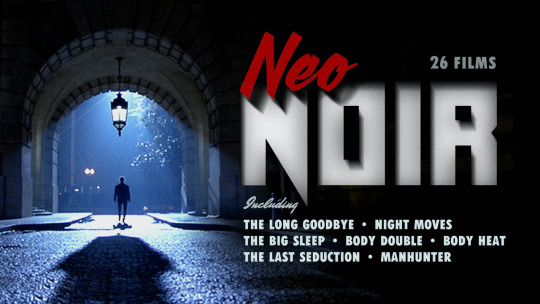
I have written up all 26 films* in the Criterion Channel's Neo-Noir Collection.
Legend:
rw - rewatch; a movie I had seen before going through the collection
dnrw - did not rewatch; if a movie met two criteria (a. I had seen it within the last 18 months, b. I actively dislike it) I wrote it up from memory.
* in September, Brick leaves the Criterion Channel and is replaced in the collection with Michael Mann's Thief. May add it to the list when that happens.
Note: These are very "what was on my mind after watching." No effort has been made to avoid spoilers, nor to make the plot clear for anyone who hasn't seen the movies in question. Decide for yourself if that's interesting to you.
Cotton Comes to Harlem
I feel utterly unequipped to asses this movie. This and Sweet Sweetback's Baadasssss Song the following year are regularly cited as the progenitors of the blaxploitation genre. (This is arguably unfair, since both were made by Black men and dealt much more substantively with race than the white-directed films that followed them.) Its heroes are a couple of Black cops who are treated with suspicion both by their white colleagues and by the Black community they're meant to police. I'm not 100% clear on whether they're the good guys? I mean, I think they are. But the community's suspicion of them seems, I dunno... well-founded? They are working for The Man. And there's interesting discussion to the had there - is the the problem that the law is carried out by racists, or is the law itself racist? Can Black cops make anything better? But it feels like the film stacks the deck in Gravedigger and Coffin Ed's favor; the local Black church is run by a conman, the Back-to-Africa movement is, itself, a con, and the local Black Power movement is treated as an obstacle. Black cops really are the only force for justice here. Movie portrays Harlem itself as a warm, thriving, cultured community, but the people that make up that community are disloyal and easily fooled. Felt, to me, like the message was "just because they're cops doesn't mean they don't have Black soul," which, nowadays, we would call copaganda. But, then, do I know what I'm talking about? Do I know how much this played into or off of or against stereotypes from 1970? Was this a radical departure I don't have the context to appreciate? Is there substance I'm too white and too many decades removed to pick up on? Am I wildly overthinking this? I dunno. Seems like everyone involved was having a lot of fun, at least. That bit is contagious.
Across 110th Street
And here's the other side of the "race film" equation. Another movie set in Harlem with a Black cop pulled between the police, the criminals, and the public, but this time the film is made by white people. I like it both more and less. Pro: this time the difficult position of Black cop who's treated with suspicion by both white cops and Black Harlemites is interrogated. Con: the Black cop has basically no personality other than "honest cop." Pro: the racism of the police force is explicit and systemic, as opposed to comically ineffectual. Con: the movie is shaped around a racist white cop who beats the shit out of Black people but slowly forms a bond with his Black partner. Pro: the Black criminal at the heart of the movie talks openly about how the white world has stacked the deck against him, and he's soulful and relateable. Con: so of course he dies in the end, because the only way privileged people know to sympathetize with minorities is to make them tragic (see also: The Boys in the Band, Philadelphia, and Brokeback Mountain for gay men). Additional con: this time Harlem is portrayed as a hellhole. Barely any of the community is even seen. At least the shot at the end, where the criminal realizes he's going to die and throws the bag of money off a roof and into a playground so the Black kids can pick it up before the cops reclaim it was powerful. But overall... yech. Cotton Comes to Harlem felt like it wasn't for me; this feels like it was 100% for me and I respect it less for that.
The Long Goodbye (rw)
The shaggiest dog. Like much Altman, more compelling than good, but very compelling. Raymond Chandler's story is now set in the 1970's, but Philip Marlowe is the same Philip Marlowe of the 1930's. I get the sense there was always something inherently sad about Marlowe. Classic noir always portrayed its detectives as strong-willed men living on the border between the straightlaced world and its seedy underbelly, crossing back and forth freely but belonging to neither. But Chandler stresses the loneliness of it - or, at least, the people who've adapted Chandler do. Marlowe is a decent man in an indecent world, sorting things out, refusing to profit from misery, but unable to set anything truly right. Being a man out of step is here literalized by putting him forty years from the era where he belongs. His hardboiled internal monologue is now the incessant mutterings of the weird guy across the street who never stops smoking. Like I said: compelling! Kael's observation was spot on: everyone in the movie knows more about the mystery than he does, but he's the only one who cares. The mystery is pretty threadbare - Marlowe doesn't detect so much as end up in places and have people explain things to him. But I've seen it two or three times now, and it does linger.
Chinatown (rw)
I confess I've always been impressed by Chinatown more than I've liked it. Its story structure is impeccable, its atmosphere is gorgeous, its noirish fatalism is raw and real, its deconstruction of the noir hero is well-observed, and it's full of clever detective tricks (the pocket watches, the tail light, the ruler). I've just never connected with it. Maybe it's a little too perfectly crafted. (I feel similar about Miller's Crossing.) And I've always been ambivalent about the ending. In Towne's original ending, Evelyn shoots Noah Cross dead and get arrested, and neither she nor Jake can tell the truth of why she did it, so she goes to jail for murder and her daughter is in the wind. Polansky proposed the ending that exists now, where Evelyn just dies, Cross wins, and Jake walks away devastated. It communicates the same thing: Jake's attempt to get smart and play all the sides off each other instead of just helping Evelyn escape blows up in his face at the expense of the woman he cares about and any sense of real justice. And it does this more dramatically and efficiently than Towne's original ending. But it also treats Evelyn as narratively disposable, and hands the daughter over to the man who raped Evelyn and murdered her husband. It makes the women suffer more to punch up the ending. But can I honestly say that Towne's ending is the better one? It is thematically equal, dramatically inferior, but would distract me less. Not sure what the calculus comes out to there. Maybe there should be a third option. Anyway! A perfect little contraption. Belongs under a glass dome.
Night Moves (rw)
Ah yeah, the good shit. This is my quintessential 70's noir. This is three movies in a row about detectives. Thing is, the classic era wasn't as chockablock with hardboiled detectives as we think; most of those movies starred criminals, cops, and boring dudes seduced to the darkness by a pair of legs. Gumshoes just left the strongest impressions. (The genre is said to begin with Maltese Falcon and end with Touch of Evil, after all.) So when the post-Code 70's decided to pick the genre back up while picking it apart, it makes sense that they went for the 'tecs first. The Long Goodbye dragged the 30's detective into the 70's, and Chinatown went back to the 30's with a 70's sensibility. But Night Moves was about detecting in the Watergate era, and how that changed the archetype. Harry Moseby is the detective so obsessed with finding the truth that he might just ruin his life looking for it, like the straight story will somehow fix everything that's broken, like it'll bring back a murdered teenager and repair his marriage and give him a reason to forgive the woman who fucked him just to distract him from some smuggling. When he's got time to kill, he takes out a little, magnetic chess set and recreates a famous old game, where three knight moves (get it?) would have led to a beautiful checkmate had the player just seen it. He keeps going, self-destructing, because he can't stand the idea that the perfect move is there if he can just find it. And, no matter how much we see it destroy him, we, the audience, want him to keep going; we expect a satisfying resolution to the mystery. That's what we need from a detective picture; one character flat-out compares Harry to Sam Spade. But what if the truth is just... Watergate? Just some prick ruining things for selfish reasons? Nothing grand, nothing satisfying. Nothing could be more noir, or more neo-, than that.
Farewell, My Lovely
Sometimes the only thing that makes a noir neo- is that it's in color and all the blood, tits, and racism from the books they're based on get put back in. This second stab at Chandler is competant but not much more than that. Mitchum works as Philip Marlowe, but Chandler's dialogue feels off here, like lines that worked on the page don't work aloud, even though they did when Bogie said them. I'll chalk it up to workmanlike but uninspired direction. (Dang this looks bland so soon after Chinatown.) Moose Malloy is a great character, and perfectly cast. (Wasn't sure at first, but it's true.) Some other interesting cats show up and vanish - the tough brothel madam based on Brenda Allen comes to mind, though she's treated with oddly more disdain than most of the other hoods and is dispatched quicker. In general, the more overt racism and misogyny doesn't seem to do anything except make the movie "edgier" than earlier attempts at the same material, and it reads kinda try-hard. But it mostly holds together. *shrug*
The Killing of a Chinese Bookie (dnrw)
Didn't care for this at all. Can't tell if the script was treated as a jumping-off point or if the dialogue is 100% improvised, but it just drags on forever and is never that interesting. Keeps treating us to scenes from the strip club like they're the opera scenes in Amadeus, and, whatever, I don't expect burlesque to be Mozart, but Cosmo keeps saying they're an artful, classy joint, and I keep waiting for the show to be more than cheap, lazy camp. How do you make gratuitious nudity boring? Mind you, none of this is bad as a rule - I love digressions and can enjoy good sleaze, and it's clear the filmmakers care about what they're making. They just did not sell it in a way I wanted to buy. Can't remember what edit I watched; I hope it was the 135 minute one, because I cannot imagine there being a longer edit out there.
The American Friend (dnrw)
It's weird that this is Patricia Highsmith, right? That Dennis Hopper is playing Tom Ripley? In a cowboy hat? I gather that Minghella's version wasn't true to the source, but I do love that movie, and this is a long, long way from that. This Mr. Ripley isn't even particularly talented! Anyway, this has one really great sequence, where a regular guy has been coerced by crooks into murdering someone on a train platform, and, when the moment comes to shoot, he doesn't. And what follows is a prolonged sequence of an amateur trying to surreptitiously tail a guy across a train station and onto another train, and all the while you're not sure... is he going to do it? is he going to chicken out? is he going to do it so badly he gets caught? It's hard not to put yourself in the protagonist's shoes, wondering how you would handle the situation, whether you could do it, whether you could act on impulse before your conscience could catch up with you. It drags on a long while and this time it's a good thing. Didn't much like the rest of the movie, it's shapeless and often kind of corny, and the central plot hook is contrived. (It's also very weird that this is the only Wim Wenders I've seen.) But, hey, I got one excellent sequence, not gonna complain.
The Big Sleep
Unlike the 1946 film, I can follow the plot of this Big Sleep. But, also unlike the 1946 version, this one isn't any damn fun. Mitchum is back as Marlowe (this is three Marlowes in five years, btw), and this time it's set in the 70's and in England, for some reason. I don't find this offensive, but neither do I see what it accomplishes? Most of the cast is still American. (Hi Jimmy!) Still holds together, but even less well than Farewell, My Lovely. But I do find it interesting that the neo-noir era keeps returning to Chandler while it's pretty much left Hammet behind (inasmuch as someone whose genes are spread wide through the whole genre can be left behind). Spade and the Continental Op, straightshooting tough guys who come out on top in the end, seem antiquated in the (post-)modern era. But Marlowe's goodness being out of sync with the world around him only seems more poignant the further you take him from his own time. Nowadays you can really only do Hammett as pastiche, but I sense that you could still play Chandler straight.
Eyes of Laura Mars
The most De Palma movie I've seen not made by De Palma, complete with POV shots, paranormal hoodoo, and fixation with sex, death, and whether images of such are art or exploitation (or both). Laura Mars takes photographs of naked women in violent tableux, and has gotten quite famous doing so, but is it damaging to women? The movie has more than a superficial engagement with this topic, but only slightly more than superficial. Kept imagining a movie that is about 30% less serial killer story and 30% more art conversations. (But, then, I have an art degree and have never murdered anyone, so.) Like, museums are full of Biblical paintings full of nude women and slaughter, sometimes both at once, and they're called masterpieces. Most all of them were painted by men on commission from other men. Now Laura Mars makes similar images in modern trappings, and has models made of flesh and blood rather than paint, and it's scandalous? Why is it only controversial once women are getting paid for it? On the other hand, is this just the master's tools? Is she subverting or challenging the male gaze, or just profiting off of it? Or is a woman profiting off of it, itself, a subversion? Is it subversive enough to account for how it commodifies female bodies? These questions are pretty clearly relevant to the movie itself, and the movies in general, especially after the fall of the Hays Code when people were really unrestrained with the blood and boobies. And, heck, the lead is played by the star of Bonnie and Clyde! All this is to say: I wish the movie were as interested in these questions as I am. What's there is a mildly diverting B-picture. There's one great bit where Laura's seeing through the killer's eyes (that's the hook, she gets visions from the murderer's POV; no, this is never explained) and he's RIGHT BEHIND HER, so there's a chase where she charges across an empty room only able to see her own fleeing self from ten feet behind. That was pretty great! And her first kiss with the detective (because you could see a mile away that the detective and the woman he's supposed to protect are gonna fall in love) is immediately followed by the two freaking out about how nonsensical it is for them to fall in love with each other, because she's literally mourning multiple deaths and he's being wildly unprofessional, and then they go back to making out. That bit was great, too. The rest... enh.
The Onion Field
What starts off as a seemingly not-that-noirish cops-vs-crooks procedural turns into an agonizingly protracted look at the legal system, with the ultimate argument that the very idea of the law ever resulting in justice is a lie. Hoo! I have to say, I'm impressed. There's a scene where a lawyer - whom I'm not sure is even named, he's like the seventh of thirteen we've met - literally quits the law over how long this court case about two guys shooting a cop has taken. He says the cop who was murdered has been forgotten, his partner has never gotten to move on because the case has lasted eight years, nothing has been accomplished, and they should let the two criminals walk and jail all the judges and lawyers instead. It's awesome! The script is loaded with digressions and unnecessary details, just the way I like it. Can't say I'm impressed with the execution. Nothing is wrong, exactly, but the performances all seem a tad melodramatic or a tad uninspired. Camerawork is, again, purely functional. It's no masterpiece. But that second half worked for me. (And it's Ted Danson's first movie! He did great.)
Body Heat (rw)
Let's say up front that this is a handsomely-made movie. Probably the best looking thing on the list since Night Moves. Nothing I've seen better captures the swelter of an East Coast heatwave, or the lusty feeling of being too hot to bang and going at it regardless. Kathleen Turner sells the hell out of a femme fatale. There are a lot of good lines and good performances (Ted Danson is back and having the time of his life). I want to get all that out of the way, because this is a movie heavily modeled after Double Indemnity, and I wanted to discuss its merits before I get into why inviting that comparison doesn't help the movie out. In a lot of ways, it's the same rules as the Robert Mitchum Marlowe movies - do Double Indemnity but amp up the sex and violence. And, to a degree it works. (At least, the sex does, dunno that Double Indemnity was crying out for explosions.) But the plot is amped as well, and gets downright silly. Yeah, Mrs. Dietrichson seduces Walter Neff so he'll off her husband, but Neff clocks that pretty early and goes along with it anyway. Everything beyond that is two people keeping too big a secret and slowly turning on each other. But here? For the twists to work Matty has to be, from frame one, playing four-dimensional chess on the order of Senator Palpatine, and its about as plausible. (Exactly how did she know, after she rebuffed Ned, he would figure out her local bar and go looking for her at the exact hour she was there?) It's already kind of weird to be using the spider woman trope in 1981, but to make her MORE sexually conniving and mercenary than she was in the 40's is... not great. As lurid trash, it's pretty fun for a while, but some noir stuff can't just be updated, it needs to be subverted or it doesn't justify its existence.
Blow Out
Brian De Palma has two categories of movie: he's got his mainstream, director-for-hire fare, where his voice is either reigned in or indulged in isolated sequences that don't always jive with the rest fo the film, and then there's his Brian De Palma movies. My mistake, it seems, is having seen several for-hires from throughout his career - The Untouchables (fine enough), Carlito's Way (ditto, but less), Mission: Impossible (enh) - but had only seen De Palma-ass movies from his late period (Femme Fatale and The Black Dahlia, both of which I think are garbage). All this to say: Blow Out was my first classic-era De Palma, and holy fucking shit dudes. This was (with caveats) my absolute and entire jam. I said I could enjoy good sleaze, and this is good friggin' sleaze. (Though far short of De Palma at his sleaziest, mercifully.) The splitscreens, the diopter shots, the canted angles, how does he make so many shlocky things work?! John Travolta's sound tech goes out to get fresh wind fx for the movie he's working on, and we get this wonderful sequence of visuals following sounds as he turns his attention and his microphone to various noises - a couple on a walk, a frog, an owl, a buzzing street lamp. Later, as he listens back to the footage, the same sequence plays again, but this time from his POV; we're seeing his memory as guided by the same sequence of sounds, now recreated with different shots, as he moves his pencil in the air mimicking the microphone. When he mixes and edits sounds, we hear the literal soundtrack of the movie we are watching get mixed and edited by the person on screen. And as he tries to unravel a murder mystery, he uses what's at hand: magnetic tape, flatbed editors, an animation camera to turn still photos from the crime scene into a film and sync it with the audio he recorded; it's forensics using only the tools of the editing room. As someone who's spent some time in college editing rooms, this is a hoot and a half. Loses a bit of steam as it goes on and the film nerd stuff gives way to a more traditional thriller, but rallies for a sound-tech-centered final setpiece, which steadily builds to such madcap heights you can feel the air thinning, before oddly cutting its own tension and then trying to build it back up again. It doesn't work as well the second time. But then, that shot right after the climax? Damn. Conflicted on how the movie treats the female lead. I get why feminist film theorists are so divided on De Palma. His stuff is full of things feminists (rightly) criticize, full of women getting naked when they're not getting stabbed, but he also clearly finds women fascinating and has them do empowered and unexpected things, and there are many feminist reads of his movies. Call it a mixed bag. But even when he's doing tropey shit, he explores the tropes in unexpected ways. Definitely the best movie so far that I hadn't already seen.
Cutter's Way (rw)
Alex Cutter is pitched to us as an obnoxious-but-sympathetic son of a bitch, and, you know, two out of three ain't bad. Watched this during my 2020 neo-noir kick and considered skipping it this time because I really didn't enjoy it. Found it a little more compelling this go around, while being reminded of why my feelings were room temp before. Thematically, I'm onboard: it's about a guy, Cutter, getting it in his head that he's found a murderer and needs to bring him to justice, and his friend, Bone, who intermittently helps him because he feels bad that Cutter lost his arm, leg, and eye in Nam and he also feels guilty for being in love with Cutter's wife. The question of whether the guy they're trying to bring down actually did it is intentionally undefined, and arguably unimportant; they've got personal reasons to see this through. Postmodern and noirish, fixated with the inability to ever fully know the truth of anything, but starring people so broken by society that they're desperate for certainty. (Pretty obvious parallels to Vietnam.) Cutter's a drunk and kind of an asshole, but understandably so. Bone's shiftlessness is the other response to a lack of meaning in the world, to the point where making a decision, any decision, feels like character growth, even if it's maybe killing a guy whose guilt is entirely theoretical. So, yeah, I'm down with all of this! A- in outline form. It's just that Cutter is so uninterestingly unpleasant and no one else on screen is compelling enough to make up for it. His drunken windups are tedious and his sanctimonious speeches about what the war was like are, well, true and accurate but also obviously manipulative. It's two hours with two miserable people, and I think Cutter's constant chatter is supposed to be the comic relief but it's a little too accurate to drunken rambling, which isn't funny if you're not also drunk. He's just tedious, irritating, and periodically racist. Pass.
Blood Simple (rw)
I'm pretty cool on the Coens - there are things I've liked, even loved, in every Coen film I've seen, but I always come away dissatisfied. For a while, I kept going to their movies because I was sure eventually I'd love one without qualification. No Country for Old Men came close, the first two acts being master classes in sustained tension. But then the third act is all about denying closure: the protagonist is murdered offscreen, the villain's motives are never explained, and it ends with an existentialist speech about the unfathomable cruelty of the world. And it just doesn't land for me. The archness of the Coen's dialogue, the fussiness of their set design, the kinda-intimate, kinda-awkward, kinda-funny closeness of the camera's singles, it cannot sell me on a devastating meditation about meaninglessness. It's only ever sold me on the Coens' own cleverness. And that archness, that distancing, has typified every one of their movies I've come close to loving. Which is a long-ass preamble to saying, holy heck, I was not prepared for their very first movie to be the one I'd been looking for! I watched it last year and it remains true on rewatch: Blood Simple works like gangbusters. It's kind of Double Indemnity (again) but played as a comedy of errors, minus the comedy: two people romantically involved feeling their trust unravel after a murder. And I think the first thing that works for me is that utter lack of comedy. It's loaded with the Coens' trademark ironies - mostly dramatic in this case - but it's all played straight. Unlike the usual lead/femme fatale relationship, where distrust brews as the movie goes on, the audience knows the two main characters can trust each other. There are no secret duplicitous motives waiting to be revealed. The audience also know why they don't trust each other. (And it's all communicated wordlessly, btw: a character enters a scene and we know, based on the information that character has, how it looks to them and what suspicions it would arouse, even as we know the truth of it). The second thing that works is, weirdly, that the characters aren't very interesting?! Ray and Abby have almost no characterization. Outside of a general likability, they are blank slates. This is a weakness in most films, but, given the agonizingly long, wordless sequences where they dispose of bodies or hide from gunfire, you're left thinking not "what will Ray/Abby do in this scenario," because Ray and Abby are relatively elemental and undefined, but "what would I do in this scenario?" Which creates an exquisite tension but also, weirdly, creates more empathy than I feel for the Coens' usual cast of personalities. It's supposed to work the other way around! Truly enjoyable throughout but absolutely wonderful in the suspenseful-as-hell climax. Good shit right here.
Body Double
The thing about erotic thrillers is everything that matters is in the name. Is it thrilling? Is it erotic? Good; all else is secondary. De Palma set out to make the most lurid, voyeuristic, horny, violent, shocking, steamy movie he could come up with, and its success was not strictly dependent on the lead's acting ability or the verisimilitude of the plot. But what are we, the modern audience, to make of it once 37 years have passed and, by today's standards, the eroticism is quite tame and the twists are no longer shocking? Then we're left with a nonsensical riff on Vertigo, a specularization of women that is very hard to justify, and lead actor made of pulped wood. De Palma's obsessions don't cohere into anything more this time; the bits stolen from Hitchcock aren't repurposed to new ends, it really is just Hitch with more tits and less brains. (I mean, I still haven't seen Vertigo, but I feel 100% confident in that statement.) The diopter shots and rear-projections this time look cheap (literally so, apparently; this had 1/3 the budget of Blow Out). There are some mildly interesting setpieces, but nothing compared to Travolta's auditory reconstructions or car chase where he tries to tail a subway train from street level even if it means driving through a frickin parade like an inverted French Connection, goddamn Blow Out was a good movie! Anyway. Melanie Griffith seems to be having fun, at least. I guess I had a little as well, but it was, at best, diverting, and a real letdown.
The Hit
Surprised by how much I enjoyed this one. Terrance Stamp flips on the mob and spends ten years living a life of ease in Spain, waiting for the day they find and kill him. Movie kicks off when they do find him, and what follows is a ramshackle road movie as John Hurt and a young Tim Roth attempt to drive him to Paris so they can shoot him in front of his old boss. Stamp is magnetic. He's spent a decade reading philosophy and seems utterly prepared for death, so he spends the trip humming, philosophizing, and being friendly with his captors when he's not winding them up. It remains unclear to the end whether the discord he sews between Roth and Hurt is part of some larger plan of escape or just for shits and giggles. There's also a decent amount of plot for a movie that's not terribly plot-driven - just about every part of the kidnapping has tiny hitches the kidnappers aren't prepared for, and each has film-long repercussions, drawing the cops closer and somehow sticking Laura del Sol in their backseat. The ongoing questions are when Stamp will die, whether del Sol will die, and whether Roth will be able to pull the trigger. In the end, it's actually a meditation on ethics and mortality, but in a quiet and often funny way. It's not going to go down as one of my new favs, but it was a nice way to spend a couple hours.
Trouble in Mind (dnrw)
I fucking hated this movie. It's been many months since I watched it, do I remember what I hated most? Was it the bit where a couple of country bumpkins who've come to the city walk into a diner and Mr. Bumpkin clocks that the one Black guy in the back as obviously a criminal despite never having seen him before? Was it the part where Kris Kristofferson won't stop hounding Mrs. Bumpkin no matter how many times she demands to be left alone, and it's played as romantic because obviously he knows what she needs better than she does? Or is it the part where Mr. Bumpkin reluctantly takes a job from the Obvious Criminal (who is, in fact, a criminal, and the only named Black character in the movie if I remember correctly, draw your own conclusions) and, within a week, has become a full-blown hood, which is exemplified by a lot, like, a lot of queer-coding? The answer to all three questions is yes. It's also fucking boring. Even out-of-drag Divine's performance as the villain can't save it.
Manhunter
'sfine? I've still never seen Silence of the Lambs, nor any of the Hopkins Lecter movies, nor, indeed, any full episode of the show. So the unheimlich others get seeing Brian Cox play Hannibal didn't come into play. Cox does a good job with him, but he's barely there. Shame, cuz he's the most interesting part of the movie. Honestly, there's a lot of interesting stuff that's barely there. Will Graham being a guy who gets into the heads of serial killers is explored well enough, and Mann knows how to direct a police procedural such that it's both contemplative and propulsive. But all the other themes it points at? Will's fear that he understands murderers a little too well? Hannibal trying to nudge him towards becoming one? Whatever dance Hannibal and Tooth Fairy are doing? What Tooth Fairy's deal is, anyway? (Why does he wear fake teeth and bite things? Why is he fixated on the red dragon? Does the bit where he says "Francis is gone forever" mean he has DID?) None of it goes anywhere or amounts to anything. I mean, it's certainly more interesting with this stuff than without, but it has that feel of a book that's been pared of its interesting bits to fit the runtime (or, alternately, pulp that's been sloppily elevated). I still haven't made my mind up on Mann's cold, precise camera work, but at least it gives me something to look at. It's fine! This is fine.
Mona Lisa (rw)
Gave this one another shot. Bob Hoskins is wonderful as a hood out of his depth in classy places, quick to anger but just as quick to let anger go (the opening sequence where he's screaming on his ex-wife's doorstep, hurling trash cans at her house, and one minute later thrilled to see his old car, is pretty nice). And Cathy Tyson's working girl is a subtler kind of fascinating, exuding a mixture of coldness and kindness. It's just... this is ultimately a story about how heartbreaking it is when the girl you like is gay, right? It's Weezer's Pink Triangle: The Movie. It's not homophobic, exactly - Simone isn't demonized for being a lesbian - but it's still, like, "man, this straight white guy's pain is so much more interesting than the Black queer sex worker's." And when he's yelling "you woulda done it!" at the end, I can't tell if we're supposed to agree with him. Seems pretty clear that she wouldn'ta done it, at least not without there being some reveal about her character that doesn't happen, but I don't think the ending works if we don't agree with him, so... I'm like 70% sure the movie does Simone dirty there. For the first half, their growing relationship feels genuine and natural, and, honestly, the story being about a real bond that unfortunately means different things to each party could work if it didn't end with a gun and a sock in the jaw. Shape feels jagged as well; what feels like the end of the second act or so turns out to be the climax. And some of the symbolism is... well, ok, Simone gives George money to buy more appropriate clothes for hanging out in high end hotels, and he gets a tan leather jacket and a Hawaiian shirt, and their first proper bonding moment is when she takes him out for actual clothes. For the rest of the movie he is rocking double-breasted suits (not sure I agree with the striped tie, but it was the eighties, whaddya gonna do?). Then, in the second half, she sends him off looking for her old streetwalker friend, and now he looks completely out of place in the strip clubs and bordellos. So far so good. But then they have this run-in where her old pimp pulls a knife and cuts George's arm, so, with his nice shirt torn and it not safe going home (I guess?) he starts wearing the Hawaiian shirt again. So around the time he's starting to realize he doesn't really belong in Simone's world or the lowlife world he came from anymore, he's running around with the classy double-breasted suit jacket over the garish Hawaiian shirt, and, yeah, bit on the nose guys. Anyway, it has good bits, I just feel like a movie that asks me to feel for the guy punching a gay, Black woman in the face needs to work harder to earn it. Bit of wasted talent.
The Bedroom Window
Starts well. Man starts an affair with his boss' wife, their first night together she witnesses an attempted murder from his window, she worries going to the police will reveal the affair to her husband, so the man reports her testimony to the cops claiming he's the one who saw it. Young Isabelle Huppert is the perfect woman for a guy to risk his career on a crush over, and Young Steve Guttenberg is the perfect balance of affability and amorality. And it flows great - picks just the right media to res. So then he's talking to the cops, telling them what she told him, and they ask questions he forgot to ask her - was the perp's jacket a blazer or a windbreaker? - and he has to guess. Then he gets called into the police lineup, and one guy matches her description really well, but is it just because he's wearing his red hair the way she described it? He can't be sure, doesn't finger any of them. He finds out the cops were pretty certain about one of the guys, so he follows the one he thinks it was around, looking for more evidence, and another girl is attacked right outside a bar he knows the redhead was at. Now he's certain! But he shows the boss' wife the guy and she's not certain, and she reminds him they don't even know if the guy he followed is the same guy the police suspected! And as he feeds more evidence to the cops, he has to lie more, because he can't exactly say he was tailing the guy around the city. So, I'm all in now. Maybe it's because I'd so recently rewatched Night Moves and Cutter's Way, but this seems like another story about uncertainty. He's really certain about the guy because it fits narratively, and we, the audience, feel the same. But he's not actually a witness, he doesn't have actual evidence, he's fitting bits and pieces together like a conspiracy theorist. He's fixating on what he wants to be true. Sign me up! But then it turns out he's 100% correct about who the killer is but his lies are found out and now the cops think he's the killer and I realize, oh, no, this movie isn't nearly as smart as I thought it was. Egg on my face! What transpires for the remaining half of the runtime is goofy as hell, and someone with shlockier sensibilities could have made a meal of it, but Hanson, despite being a Corman protege, takes this silliness seriously in the all wrong ways. Next!
Homicide (rw? I think I saw most of this on TV one time)
Homicide centers around the conflicted loyalties of a Jewish cop. It opens with the Jewish cop and his white gentile partner taking over a case with a Black perp from some Black FBI agents. The media is making a big thing about the racial implications of the mostly white cops chasing down a Black man in a Black neighborhood. And inside of 15 minutes the FBI agent is calling the lead a k*ke and the gentile cop is calling the FBI agent a f****t and there's all kinds of invective for Black people. The film is announcing its intentions out the gate: this movie is about race. But the issue here is David Mamet doesn't care about race as anything other than a dramatic device. He's the Ubisoft of filmmakers, having no coherent perspective on social issues but expecting accolades for even bringing them up. Mamet is Jewish (though lead actor Joe Mantegna definitely is not) but what is his position on the Jewish diaspora? The whole deal is Mantegna gets stuck with a petty homicide case instead of the big one they just pinched from the Feds, where a Jewish candy shop owner gets shot in what looks like a stickup. Her family tries to appeal to his Jewishness to get him to take the case seriously, and, after giving them the brush-off for a long time, finally starts following through out of guilt, finding bits and pieces of what may or may not be a conspiracy, with Zionist gun runners and underground neo-Nazis. But, again: all of these are just dramatic devices. Mantegna's Jewishness (those words will never not sound ridiculous together) has always been a liability for him as a cop (we are told, not shown), and taking the case seriously is a reclamation of identity. The Jews he finds community with sold tommyguns to revolutionaries during the founding of Israel. These Jews end up blackmailing him to get a document from the evidence room. So: what is the film's position on placing stock in one's Jewish identity? What is its position on Israel? What is its opinion on Palestine? Because all three come up! And the answer is: Mamet doesn't care. You can read it a lot of different ways. Someone with more context and more patience than me could probably deduce what the de facto message is, the way Chris Franklin deduced the de facto message of Far Cry V despite the game's efforts not to have one, but I'm not going to. Mantegna's attempt to reconnect with his Jewishness gets his partner killed, gets the guy he was supposed to bring in alive shot dead, gets him possibly permanent injuries, gets him on camera blowing up a store that's a front for white nationalists, and all for nothing because the "clues" he found (pretty much exclusively by coincidence) were unconnected nothings. The problem is either his Jewishness, or his lifelong failure to connect with his Jewishness until late in life. Mamet doesn't give a shit. (Like, Mamet canonically doesn't give a shit: he is on record saying social context is meaningless, characters only exist to serve the plot, and there are no deeper meanings in fiction.) Mamet's ping-pong dialogue is fun, as always, and there are some neat ideas and characters, but it's all in service of a big nothing that needed to be a something to work.
Swoon
So much I could talk about, let's keep it to the most interesting bits. Hommes Fatales: a thing about classic noir that it was fascinated by the marginal but had to keep it in the margins. Liberated women, queer-coded killers, Black jazz players, broke thieves; they were the main event, they were what audiences wanted to see, they were what made the movies fun. But the ending always had to reassert straightlaced straight, white, middle-class male society as unshakeable. White supremacist capitalist patriarchy demanded, both ideologically and via the Hays Code, that anyone outside these norms be punished, reformed, or dead by the movie's end. The only way to make them the heroes was to play their deaths for tragedy. It is unsurprising that neo-noir would take the queer-coded villains and make them the protagonists. Implicature: This is the story of Leopold and Loeb, murderers famous for being queer, and what's interesting is how the queerness in the first half exists entirely outside of language. Like, it's kind of amazing for a movie from 1992 to be this gay - we watch Nathan and Dickie kiss, undress, masturbate, fuck; hell, they wear wedding rings when they're alone together. But it's never verbalized. Sex is referred to as "your reward" or "what you wanted" or "best time." Dickie says he's going to have "the girls over," and it turns out "the girls" are a bunch of drag queens, but this is never acknowledged. Nathan at one point lists off a bunch of famous men - Oscar Wild, E.M. Forster, Frederick the Great - but, though the commonality between them is obvious (they were all gay), it's left the the audience to recognize it. When their queerness is finally verbalized in the second half, it's first in the language of pathology - a psychiatrist describing their "perversions" and "misuse" of their "organs" before the court, which has to be cleared of women because it's so inappropriate - and then with slurs from the man who murders Dickie in jail (a murder which is written off with no investigation because the victim is a gay prisoner instead of a L&L's victim, a child of a wealthy family). I don't know if I'd have noticed this if I hadn't read Chip Delany describing his experience as a gay man in the 50's existing almost entirely outside of language, the only language at the time being that of heteronormativity. Murder as Love Story: L&L exchange sex as payment for the other commiting crimes; it's foreplay. Their statements to the police where they disagree over who's to blame is a lover's quarrel. Their sentencing is a marriage. Nathan performs his own funeral rites over Dickie's body after he dies on the operating table. They are, in their way, together til death did they part. This is the relationship they can have. That it does all this without romanticizing the murder itself or valorizing L&L as humans is frankly incredible.
Suture (rw)
The pitch: at the funeral for his father, wealthy Vincent Towers meets his long lost half brother Clay Arlington. It is implied Clay is a child from out of wedlock, possibly an affair; no one knows Vincent has a half-brother but him and Clay. Vincent invites Clay out to his fancy-ass home in Arizona. Thing is, Vincent is suspected (correctly) by the police of having murdered his father, and, due to a striking family resemblence, he's brought Clay to his home to fake his own death. He finagles Clay into wearing his clothes and driving his car, and then blows the car up and flees the state, leaving the cops to think him dead. Thing is, Clay survives, but with amnesia. The doctors tell him he's Vincent, and he has no reason to disagree. Any discrepancy in the way he looks is dismissed as the result of reconstructive surgery after the explosion. So Clay Arlington resumes Vincent Towers' life, without knowing Clay Arlington even exists. The twist: Clay and Vincent are both white, but Vincent is played by Michael Harris, a white actor, and Clay is played by Dennis Haysbert, a Black actor. "Ian, if there's just the two of them, how do you know it's not Harris playing a Black character?" Glad you asked! It is most explicitly obvious during a scene where Vincent/Clay's surgeon-cum-girlfriend essentially bringing up phrenology to explain how Vincent/Clay couldn't possibly have murdered his father, describing straight hair, thin lips, and a Greco-Roman nose Haysbert very clearly doesn't have. But, let's be honest: we knew well beforehand that the rich-as-fuck asshole living in a huge, modern house and living it up in Arizona high society was white. Though Clay is, canonically, white, he lives an poor and underprivileged life common to Black men in America. Though the film's title officially refers to the many stitches holding Vincent/Clay's face together after the accident, "suture" is a film theory term, referring to the way a film audience gets wrapped up - sutured - in the world of the movie, choosing to forget the outside world and pretend the story is real. The usage is ironic, because the audience cannot be sutured in; we cannot, and are not expected to, suspend our disbelief that Clay is white. We are deliberately distanced. Consequently this is a movie to be thought about, not to to be felt. It has the shape of a Hitchcockian thriller but it can't evoke the emotions of one. You can see the scaffolding - "ah, yes, this is the part of a thriller where one man hides while another stalks him with a gun, clever." I feel ill-suited to comment on what the filmmakers are saying about race. I could venture a guess about the ending, where the psychiatrist, the only one who knows the truth about Clay, says he can never truly be happy living the lie of being Vincent Towers, while we see photographs of Clay/Vincent seemingly living an extremely happy life: society says white men simply belong at the top more than Black men do, but, if the roles could be reversed, the latter would slot in seamlessly. Maybe??? Of all the movies in this collection, this is the one I'd most want to read an essay on (followed by Swoon).
The Last Seduction (dnrw)
No, no, no, I am not rewataching this piece of shit movie.
Brick (rw)
Here's my weird contention: Brick is in color and in widescreen, but, besides that? There's nothing neo- about this noir. There's no swearing except "hell." (I always thought Tug said "goddamn" at one point but, no, he's calling The Pin "gothed-up.") There's a lot of discussion of sex, but always through implication, and the only deleted scene is the one that removed ambiguity about what Brendan and Laura get up to after kissing. There's nothing postmodern or subversive - yes, the hook is it's set in high school, but the big twist is that it takes this very seriously. It mines it for jokes, yes, but the drama is authentic. In fact, making the gumshoe a high school student, his jadedness an obvious front, still too young to be as hard as he tries to be, just makes the drama hit harder. Sam Spade if Sam Spade were allowed to cry. I've always found it an interesting counterpoint to The Good German, a movie that fastidiously mimics the aesthetics of classic noir - down to even using period-appropriate sound recording - but is wholly neo- in construction. Brick could get approved by the Hays Code. Its vibe, its plot about a detective playing a bunch of criminals against each other, even its slang ("bulls," "yegg," "flopped") are all taken directly from Hammett. It's not even stealing from noir, it's stealing from what noir stole from! It's a perfect curtain call for the collection: the final film is both the most contemporary and the most classic. It's also - but for the strong case you could make for Night Moves - the best movie on the list. It's even more appropriate for me, personally: this was where it all started for me and noir. I saw this in theaters when it came out and loved it. It was probably my favorite movie for some time. It gave me a taste for pulpy crime movies which I only, years later, realized were neo-noir. This is why I looked into Kiss Kiss, Bang Bang and In Bruges. I've seen it more times than any film on this list, by a factor of at least 3. It's why I will always adore Rian Johnson and Joseph Gordon-Levitt. It's the best-looking half-million-dollar movie I've ever seen. (Indie filmmakers, take fucking notes.) I even did a script analysis of this, and, yes, it follows the formula, but so tightly and with so much style. Did you notice that he says several of the sequence tensions out loud? ("I just want to find her." "Show of hands.") I notice new things each time I see it - this time it was how "brushing Brendan's hair out of his face" is Em's move, making him look more like he does in the flashback, and how Laura does the same to him as she's seducing him, in the moment when he misses Em the hardest. It isn't perfect. It's recreated noir so faithfully that the Innocent Girl dies, the Femme Fatale uses intimacy as a weapon, and none of the women ever appear in a scene together. 1940's gender politics maybe don't need to be revisited. They say be critical of the media you love, and it applies here most of all: it is a real criticism of something I love immensely.
44 notes
·
View notes